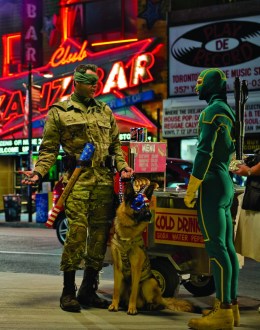
Colonel Stars and Stripes (Jim Carrey) strategizes with Kick-Ass (Aaron Taylor-Johnson) in 'Kick-Ass 2'
If you didn’t guess from the title, Kick-Ass 2 is—like its predecessor—pretty violent. At least one person involved in the production isn’t so happy about that. On June 23, actor Jim Carrey (who plays mobster-cum-crimefighter Colonel Stars and Stripes) tweeted to his 10 million followers that he could not back the film, which is due in theaters Aug. 16 . “I did Kickass a month b4 Sandy Hook and now in all good conscience I cannot support that level of violence,” he wrote, following it up with an apology to his colleagues and the clarification that he was not ashamed of the film itself but, rather, had changed his position on on-screen violence.
As Alyssa Rosenberg at ThinkProgress points out, Carrey has not elaborated on what exactly he’s bothered by and why—or even what he means by “cannot support.” Some of his fans have suggested that he donate his earnings from the film to a cause related to violence prevention, but consensus seems to be that he will at least refrain from promoting the movie. Mark Millar, the creator of the comic on which Kick-Ass is based, wrote in response to the tweet that the movie is “one of Carrey’s best-ever performances” and he’s “baffled” by what Carrey said, because it’s: (a) a work of fiction, (b) less violent than superhero blockbusters, (c) a movie that spends time talking about the consequences of violence, and (d) about a vigilante, Carrey’s character, who refuses to carry a gun. (More on that in the video below.)
(MORE: TV’s Bumper Crop of Blood)
Carrey isn’t the first actor to back-pedal on a project—but he’s still bringing something new into the mix.
Most stars do it after the fact, and mostly because they think the movie in question just isn’t much good.
Mark Wahlberg, for example, made 2008’s The Happening but then publicly said it was “a bad movie” while promoting The Fighter about two years later. Christopher Plummer waited even longer: he apparently dissed what he called “The Sound of Mucus” for the beloved musical’s 40th anniversary. There’s little incentive for actors to say something before a movie even has a chance to be a success, something they benefit from regardless of quality, unless they think it’s so bad that it will reflect badly on them—which is what happened when Brad Pitt said he tried to walk away from The Devil’s Own, just about a month before that 1997 movie was due in theaters. Likewise, the New York Times review of 1990’s The Freshman includes Marlon Brando‘s public statement that the movie is “horrible” and “going to be a flop” and “a stinker.”
On the I-won’t-do-promotions side, Edward Norton refused to promote The Hulk in 2008, due to personal differences with the film’s producers; Sean Connery also refused to participate in 50th-anniversary celebrations for the James Bond franchise. There’s a potential reason few actors follow in Norton’s footsteps: many actor contracts require participation in publicity events; if that’s the case for Carrey, he may face legal repercussions if he follows through on his tweeted intent.
Carrey, however, isn’t saying that Kick-Ass 2 is bad—he’s saying it’s, according to his thinking, wrong. This has also happened before; for example, Katherine Heigl told Vanity Fair she thought Knocked Up was sexist. A more apt comparison, however, since that also took place months after the movie was already a hit, is perhaps the decision by movie studios and TV networks to delay violent content in the days and weeks that directly follow events like the Newtown shootings.
As TIME’s James Poniewozik wrote back in December, examining that phenomenon on TV, those decisions seem to make sense at the time—but also seem to imply that everything is suddenly all better at some randomly chosen point in the future, when the news cycle has moved on and gun violence (or whatever the tragedy is in a particular case) is no longer in the news.
So that’s where Carrey is doing something we don’t see very often: he’s talking about violence in the movies when there hasn’t been a mass shooting in the last couple of days. If he follows through on his tweet, he’ll be bringing the issue into the news independent of anyone actually getting shot—which, no matter one’s take on the issue and no matter the movie, is refreshing to see.
(MORE: What We Should Be Thinking About Pop-Culture Violence, and What We Will Probably Do Instead)

